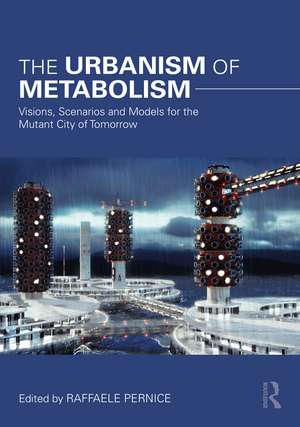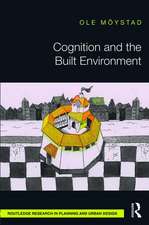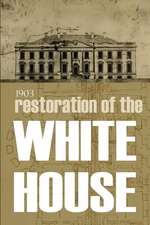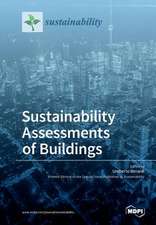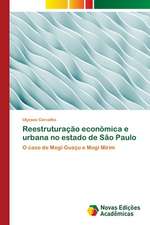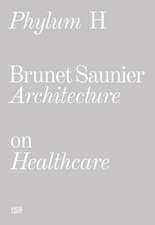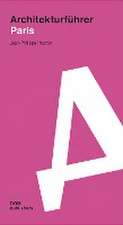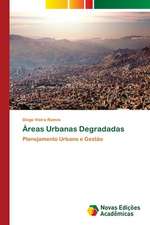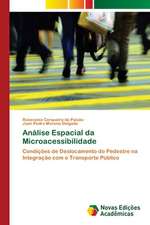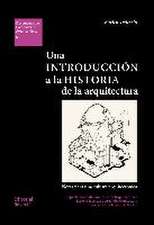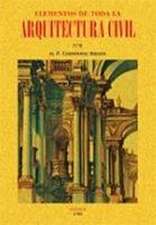The Urbanism of Metabolism: Visions, Scenarios and Models for the Mutant City of Tomorrow
Editat de Raffaele Perniceen Limba Engleză Paperback – 17 mar 2022
The essays are written by experienced scholars and renowned academics from Japan, Australia, Europe, South Korea and the United States and expose Metabolism’s special merits in promoting new urban models and evaluate the current legacy of its architectural projects and urban design lessons. They offer a critical, intellectual, and up-to-date account of the Metabolism projects and ideas with regard to the current evolution of architectural and urbanism discourse in a global context.
The collection of cross-disciplinary contributions in this volume will be of great interest to architects, architectural and urban historians, as well as academics, scholars and students in built environment disciplines and Japanese cultural studies.
Preț: 289.07 lei
Nou
Puncte Express: 434
Preț estimativ în valută:
55.33€ • 60.12$ • 46.51£
55.33€ • 60.12$ • 46.51£
Carte disponibilă
Livrare economică 31 martie-14 aprilie
Livrare express 14-20 martie pentru 33.52 lei
Preluare comenzi: 021 569.72.76
Specificații
ISBN-13: 9781032030739
ISBN-10: 1032030739
Pagini: 242
Ilustrații: 17 Line drawings, black and white; 80 Halftones, black and white; 97 Illustrations, black and white
Dimensiuni: 174 x 246 x 17 mm
Greutate: 0.48 kg
Ediția:1
Editura: Taylor & Francis
Colecția Routledge
Locul publicării:Oxford, United Kingdom
ISBN-10: 1032030739
Pagini: 242
Ilustrații: 17 Line drawings, black and white; 80 Halftones, black and white; 97 Illustrations, black and white
Dimensiuni: 174 x 246 x 17 mm
Greutate: 0.48 kg
Ediția:1
Editura: Taylor & Francis
Colecția Routledge
Locul publicării:Oxford, United Kingdom
Public țintă
Postgraduate and Undergraduate AdvancedCuprins
Foreword: The Logic of Metabolism (Toyo Ito); Introduction (Raffaele Pernice); 1. Back from Behind the Curtain of Oblivion: Metabolism and the Postwar Actuality of Japan (Hajime Yatsuka); 2. The Aesthetics and/or Formalism of Change: Paradoxes and Contradictions in the Metabolist Movement (Botond Bognar); 3. Engineering a Poetic Techno-urbanism: The Metabolists’ Visionary City in Postwar Japan (Raffaele Pernice); 4. The Metabolists in Context (Jon Lang); 5. The Infrastructure of Care: Metabolist Architecture as a Social Catalyst (Peter Šenk); 6. "Sunday Carpenter" Metabolism: Artificial-Land Housing and Resident Decision-Making (Casey Mack); 7. Maki and Dutch Team X: Step towards Group Form (Kiwa Matsushita); 8. Kikutake Kiyonori circa 2011: Sustaining Life through Metabolism (Ken Tadashi Oshima); 9. Metabolism as Survival Architecture (Hyunjung Cho); 10. Metabolism Adventure: A Personal View (Philip Drew); 11. This is Your City: The Pop Future Foretold by Metabolism (Yasutaka Tsuji); 12. Spaceship Earth: Metabolist Capsules, the Petro-economy, and Geoengineering (Yuriko Furuhata); 13. An Eternal Return? Considering the Temporality and Historicity of Metabolism (Julian Worrall); Afterword (Gevork Hartoonian)
Notă biografică
Raffaele Pernice is an Italian architect and Senior Lecturer in Architecture and Urbanism at the University of New South Wales, Sydney, Australia. He holds a Ph.D. in Architecture from Waseda University in Tokyo and a M.Arch. from the University IUAV of Venice in Italy. He has extensive research and teaching experience in Australia, East Asia, and the Middle East, and his interests and activities lie at the nexus of architecture and urbanism, ranging from design practice through to the theory and history of architecture and city planning, with a focus on the evolution of the cities of Japan and the Asia-Pacific region. He has been the recipient of scholarships and grants from universities and national and international institutions, such as the Japanese Ministry of Education (MEXT), the Italian Ministry of Foreign Affairs, the Japan Foundation, the Australian Department of Foreign Affairs and Trade (DFAT), and the Japan Society for the Promotion of Science (JSPS).
Recenzii
"Rising from the ashes of the Pacific War, a new generation of Japanese architects sought radical new ways to solve the challenges of social change and material destitution in their devastated cities. In fusing native tradition and radical modernity, they created a movement which was to influence the architecture of the twentieth century. Through a compilation of scholarly essays and personal narratives this valuable English language collection provides a cohesive evaluation of the Metabolist movement in both its domestic and international contexts. It is a comprehensive reference for both the professional and the general reader." Peter Armstrong (University of Sydney) studied under Yosizaka Takamasa and worked for Kiyonori Kikutake from 1969 to 1973
"What can we learn today from the radical visions and thinking of Japanese Metabolism of the 1960s? In this indispensable book, the best international scholars critically interpret Metabolism as an avant-garde movement, at the same time deeply anchored in the Japanese reality and a transnational phenomenon with great critical success, but also as a symptom of a condition of environmental and urban crisis to which architects must respond as a priority commitment: today as yesterday." Pierre Alain Croset, Department of Architecture and Urban Studies (DAStU), Politecnico di Milano, Italy
"Among the merits of this publication, there is the effort to present a fresh and broader new look at Metabolism by means of a series of contributions by high-calibre experts in disciplines which do not belong only to architecture. For everyone interested in Japan, this book is full of useful insights to understand modern Japanese history from the point of view of urbanism and architectural forms." Masaki Koiwa, Department of Architecture, Waseda University, Tokyo, Japan
"This book, edited by Dr. Raffaele Pernice, has as obvious feature in that the authors are all independent writers, and someone experienced the Metabolist movement in Japan in the 1960s. The scholars explore pioneering issues related to climate change and social identity worldwide which were affected by Metabolism. Besides, this book is also an engaging incipient index of Japanese modern architectural masters and their practices." Xiaoming Zhu, College of Architecture and Urban Planning, Tongji University, Shanghai, China
"A much-needed rediscovery of a significant cultural and design movement that still influences the development of global cities. The book sheds light from multiple perspectives on what Manfredo Tafuri defined as an ‘academy of the utopian’: a group of visionaries that, with their bold proposals, introduced in the global debate ideas that are still relevant today, tracing clear paths for the further developments of design disciplines." Benno Albrecht, Rector Università IUAV di Venezia, Italy
"What can we learn today from the radical visions and thinking of Japanese Metabolism of the 1960s? In this indispensable book, the best international scholars critically interpret Metabolism as an avant-garde movement, at the same time deeply anchored in the Japanese reality and a transnational phenomenon with great critical success, but also as a symptom of a condition of environmental and urban crisis to which architects must respond as a priority commitment: today as yesterday." Pierre Alain Croset, Department of Architecture and Urban Studies (DAStU), Politecnico di Milano, Italy
"Among the merits of this publication, there is the effort to present a fresh and broader new look at Metabolism by means of a series of contributions by high-calibre experts in disciplines which do not belong only to architecture. For everyone interested in Japan, this book is full of useful insights to understand modern Japanese history from the point of view of urbanism and architectural forms." Masaki Koiwa, Department of Architecture, Waseda University, Tokyo, Japan
"This book, edited by Dr. Raffaele Pernice, has as obvious feature in that the authors are all independent writers, and someone experienced the Metabolist movement in Japan in the 1960s. The scholars explore pioneering issues related to climate change and social identity worldwide which were affected by Metabolism. Besides, this book is also an engaging incipient index of Japanese modern architectural masters and their practices." Xiaoming Zhu, College of Architecture and Urban Planning, Tongji University, Shanghai, China
"A much-needed rediscovery of a significant cultural and design movement that still influences the development of global cities. The book sheds light from multiple perspectives on what Manfredo Tafuri defined as an ‘academy of the utopian’: a group of visionaries that, with their bold proposals, introduced in the global debate ideas that are still relevant today, tracing clear paths for the further developments of design disciplines." Benno Albrecht, Rector Università IUAV di Venezia, Italy
Descriere
This edited book explores and promotes reflection on how the lessons of Metabolism experience can inform current debate on city making and future practice in architectural design and urban planning.
